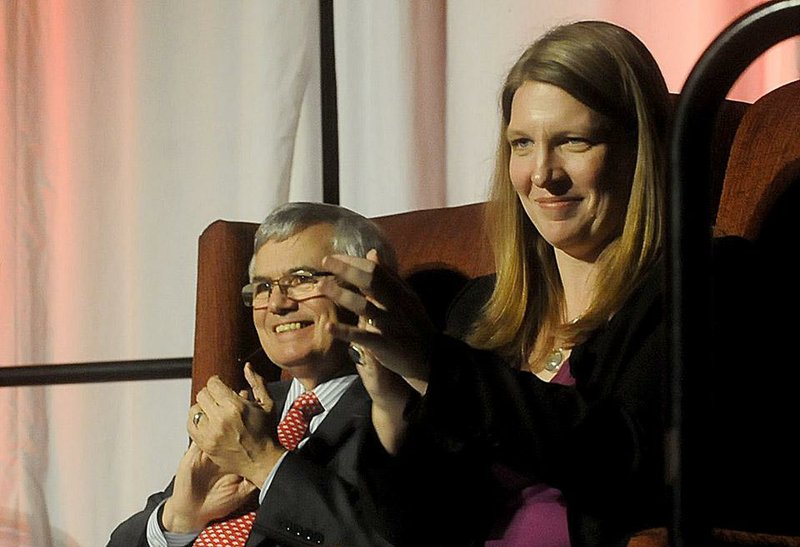FAYETTEVILLE -- Arkansas' economy will see gains in 2015 but must find the right alignment of industry and trained workforce to see breakaway growth, attendees at the 21st annual Business Forecast Lunch were told Friday.
Kathy Deck, director of the Center for Business and Economic Research at the University of Arkansas at Fayetteville, told the crowd of more than 1,000 that the state's employers say they can't find workers with the needed skills. She added that employers don't seem to be willing to increase wages to attract workers they require.
Schools must find a way to teach the skills in demand, and employers must pay those workers what the market requires to attract and keep them. Until then, job and wage growth won't advance at a significant pace, Deck said.
"It's a widely recognized problem," she said.
Carl Tannenbaum, chief economist for Northern Trust, said global economic growth is strong but uneven while the drop in oil prices is a boon for consumers but a sign of possible instability for energy producers. John Silva, managing director and chief economist for Wells Fargo, said the U.S. economy is seeing sustained growth and improvements in the housing sector, but consumers remain cautious.
The news was better than at last year's lunch, where an expert said the U.S. economy was on shaky ground and could easily fall into a second recession.
Acumen Brands co-founder John James, who emceed the event, spoke of the role that startups and innovation will play in the growth of the Northwest Arkansas economy. James recalled the struggle he had in finding investors for his company in its early days and said he is now focused on setting up a venture capital fund for promising startups.
James is working with New Road Ventures of Bentonville to build a $100 million fund. That sort of funding would help the region recruit and retain innovators who could continue the tradition of Fortune 500 companies like Tyson Foods, Wal-Mart Stores Inc. and J.B. Hunt Transport Services, all which started out as small operations.
"We're going to build another Tyson, J.B. Hunt, Wal-Mart," James said. "We're way overdue. Tyson and Walton didn't have any resources to pull from. We do now."
Deck said Arkansas saw employment growth in Northwest Arkansas, central Arkansas and Jonesboro but saw declines in Fort Smith and Pine Bluff.
In Northwest Arkansas, she said 2015 is looking like a transition year in which key employers are setting the stage for growth. Jobs in the trade, transportation and utilities sector, which accounts for 22 percent of jobs in the region, slipped nearly 4 percent from November 2013 to November 2014, while, mining, logging and construction jobs increased 6 percent in the period.
"Construction has been on fire," she said.
Silva said the American consumer is doing well, inflation remains low, and the dollar is surprisingly strong. The housing sector is strong but is shifting from single-family homes to multifamily as millennials seek to save money and be closer to work and urban centers, he said.
"It's all about the apartment," Silva said.
He also warned that the rise in subprime auto loans could lead to problems for automakers and dealers as they compromise credit standards to make sales.
Tannenbaum said the United States and the United Kingdom are the engines pulling the global economic train while China's once red-hot economy, which is slowing to a more manageable pace, sits about in the middle. Meanwhile, the struggling economies of the eurozone and Japan are the caboose.
Dramatically lower oil prices will be key to the global economy in 2015, he said. He said China's cooling economy has cut demand and the Organization of the Petroleum Exporting Countries doesn't seem to have the influence it once did over oil prices.
He said if prices remain low, U.S. consumers will see an annual savings of about $750 per family. On the downside, countries that fund social services with oil profits could become destabilized.
Information for this article was contributed by Chris Bahn of the Arkansas Democrat-Gazette.
Business on 01/31/2015

